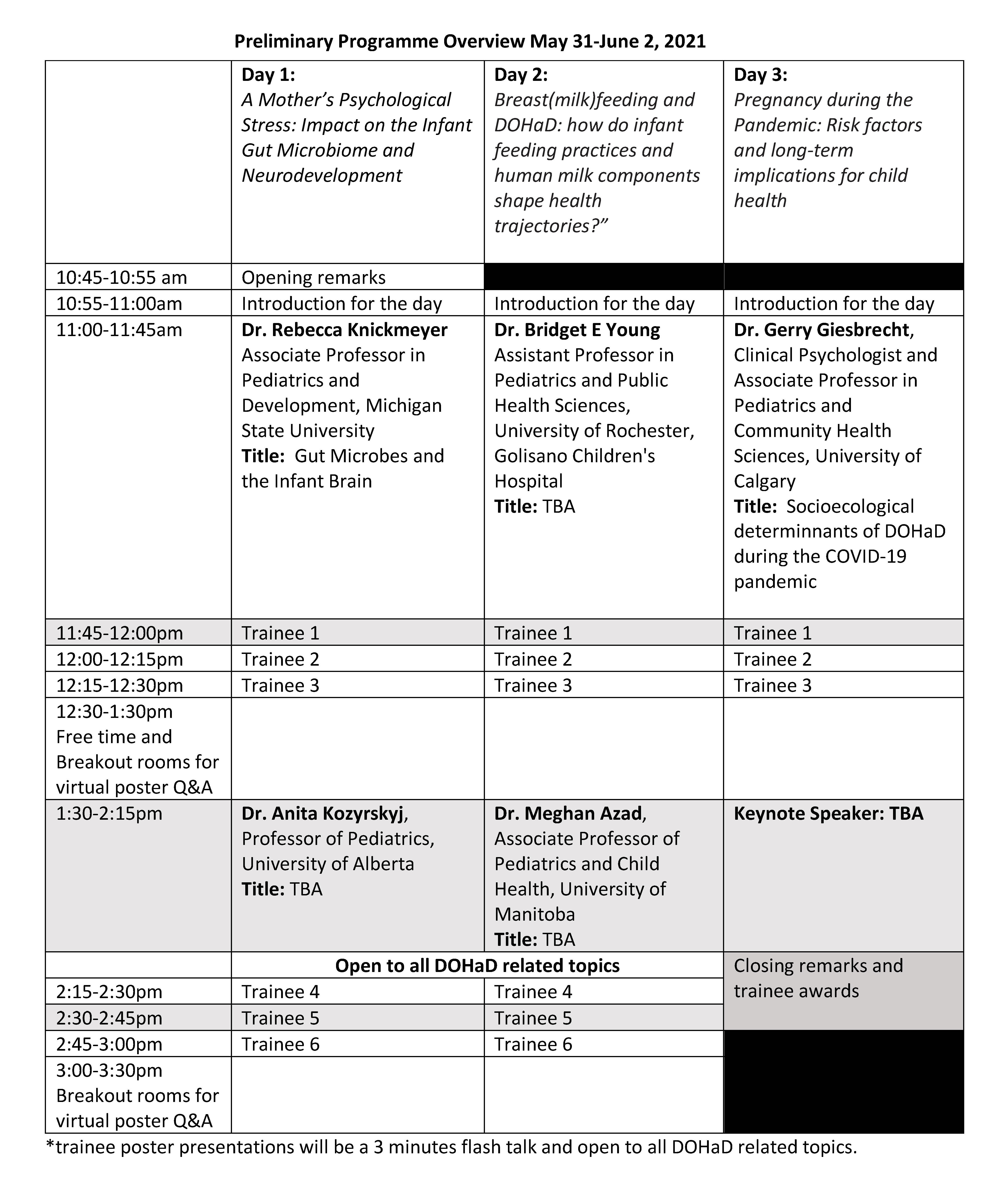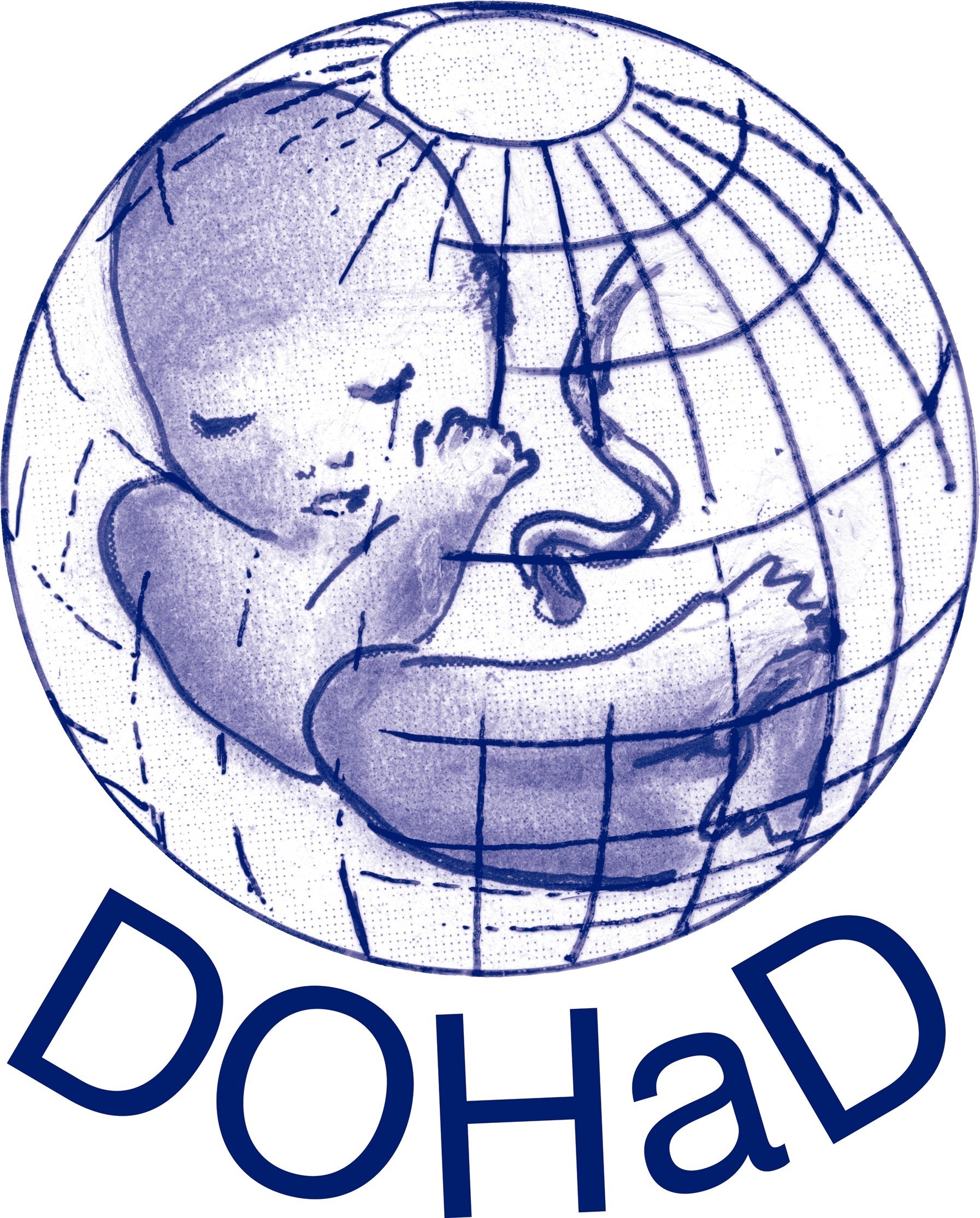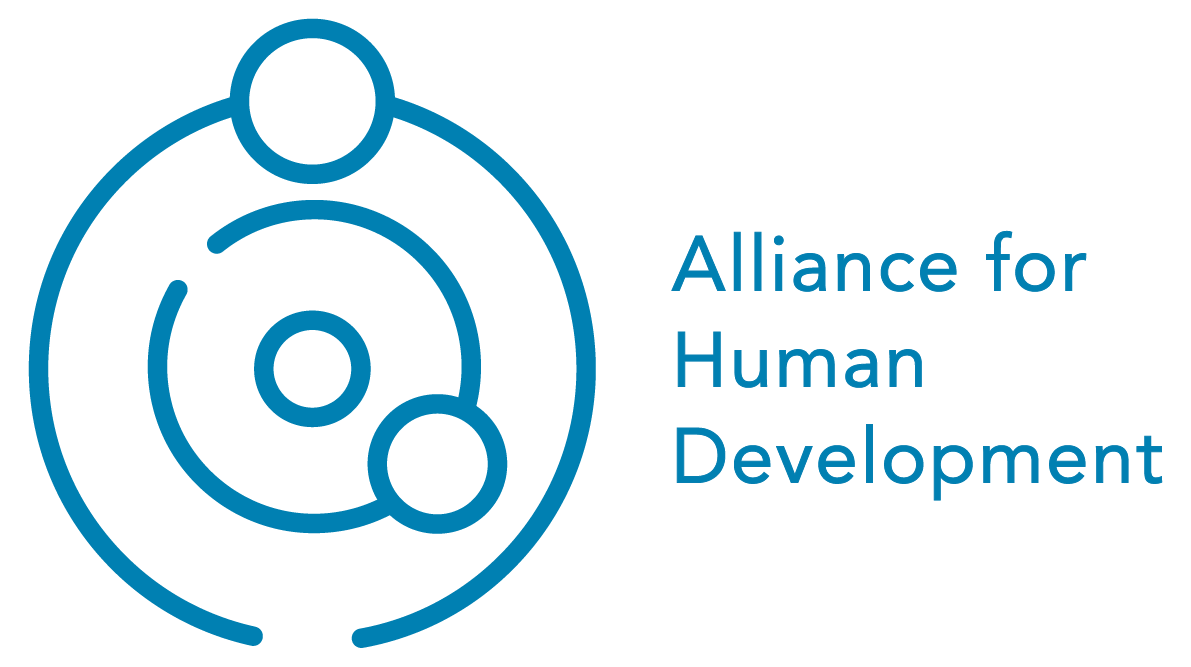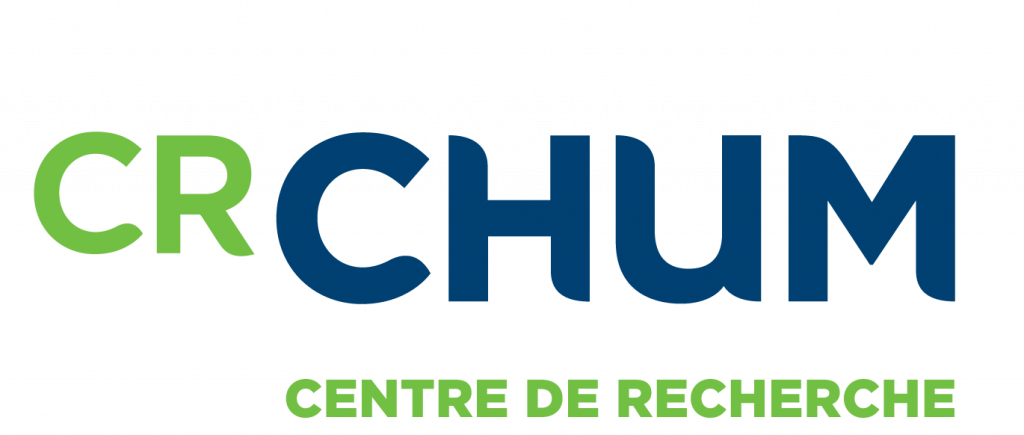DOHaD in the 21st Century: New insights, new challenges
May 31 - June 2, 2021
With more than 370 members, DOHaD Canada aims to be a nationally connected network focused on creating, translating and communicating the latest knowledge on early development to improve the immediate and long-term health of Canadians, and to promote the importance of maternal health and well-being on a global platform.
This virtual meeting will provide a venue for information exchange and dissemination, and a valuable opportunity for members to strategize and plan the network’s role in research, knowledge dissemination, and implementation of health policy, bringing together the student community and scholars from across Canada.
This year, the DOHaD Canada scientific program will address three main themes:
o Day 1: A Mother’s Psychological Stress: Impact on the Infant Gut Microbiome and Neurodevelopment
o Day 2: Breast (milk)feeding and DOHaD: how do infant feeding practices and human milk components shape health trajectories?
o Day 3: Pregnancy during the pandemic: Risk factors and long-term implications for child health
The program will include invited speaker and trainee presentations as well as poster sessions.
We are looking forward to connecting with you !
Meeting Organizers:
Sophie Petropoulos, PhD, Assistant professor-researcher, Department of Medicine, Faculty of Medicine, Université de Montréal
Anita Kozyrskyj, PhD, Professor, Department of Pediatrics, Faculty of Medicine & Dentistry, University of Alberta
Meghan Azad, PhD, Associate Professor, Pediatrics and Child Health, University of Manitoba
Gerry Giesbrecht, PhD, R.Psych, Associate Professor, Department of Paediatrics and Community Health Sciences, University of Calgary
Preliminary programme:
DAY 1, May 31, 2021
Anita Kozyrskyj: A Mother’s Psychological Stress: Impact on the Infant Gut Microbiome and Neurodevelopment
Abstract: This session will be an overview of our current knowledge regarding the impact of maternal psychological stress during pregnancy and postpartum on the microbiome and brain development in offspring. Speakers will unpack the human evidence, starting with perinatal depression, infant gut immunity and neurodevelopment, and ending with the latest findings on the mediating role of the infant gut microbiome.
DAY 2, June 1, 2021
Meghan Azad: Breast(milk)feeding and DOHaD: how do infant feeding practices and human milk components shape health trajectories?
Abstract: Breastfeeding is a critical and complex exposure that shapes early development through mechanisms ranging from epigenetics and immunity to taste preferences and the microbiome. These pathways are variably influenced by feeding methods (nursing or pumping) and styles (frequency and responsiveness), and by the tremendous variation in milk composition (nutrients and non-nutritive bioactives) among mothers and across lactation. This session will showcase new findings and emerging research on breast(milk)feeding and postnatal infant programming.
DAY 3, June 2, 2021
Gerry Giesbrecht: Pregnancy during the Pandemic: Risk factors and long-term implications for child health
Abstract: This talk will focus on experiences of psychological stress during the COVID-19 pandemic among pregnant individuals. We will examine the implications of stress, fear, uncertainty for pregnant individuals and the development of their babies. We will present preliminary findings of brain MRI showing changes in brain development among infants prenatally exposed to objective and subjective aspects of pandemic stress. We will also describe health inequities and the implications for policy and intervention to promote child health. This session will be co-presented by Lianne Tomfohr-Madsen, Gerry Giesbrecht and Catherine Lebel.
REGISTER HERE! FREE FOR TRAINEES!
Abstract submission is no longer available.
Thank you for submitting your Abstract. Authors will be notified by end of April, 2021
Registration closes: May 24th, 2021
Fees: Registration free for all trainees and $50 for PIs
Register HERE
The afternoon trainee talks will not be theme based and neither will the poster/flash oral sessions: trainee talks and flash orals/posters are open to all topics.
Speakers:
|
Bridget Young's research interests are on the impact of obesity and insulin resistance on breast milk composition, and resultant programming effects in the infant. She particularly focuses on the effect of oral insulin in human milk on infant pancreatic function and intestinal maturation in the neonate. Her lab also investigates how variation in infant formula and donor milk also impact early infant organ development. |
|
|
|
Gerry Giesbrecht, Lianne Tomfohr-Madsen and Catherine Lebel are associate professors at the University of Calgary in the departments of Pediatrics, Psychology, and Radiology, respectively. Together, they initiated the Pregnancy During the COVID-19 Pandemic study, a longitudinal, pan-Canadian pregnancy cohort study (n>10,000) that is assessing the effects of pandemic-related stress on maternal mental health and child development outcomes. Dr. Giesbrecht’s work focusses on the mechanisms by which stress becomes embedded in child development and protective factors that prevent or reduce these effects. Dr. Tomfohr-Madsen’s work focusses on understanding health trajectories in vulnerable populations and how to improve health outcomes in these groups. Dr. Lebel’s research uses MRI to study how brain structure and function change with age in typical children and those with neurodevelopmental disorders, including fetal alcohol spectrum disorder and learning disabilities. |
|
|
Co-Chairs:
|
|
|
|
|
Organizing Committee:
|
|
|
|
|
We are very grateful to our sponsors for their generous support.
Sponsors of the 2021 Scientific Meeting of the Canadian DOHaD Society:
|
|
|
|
|
|
|
|
VIRTUAL!
Further information will be provided closer to the webinar.


 Dr. Bridget Young studied Maternal and Child Nutrition at Cornell University where she received her PhD. She then pursued a postdoctoral fellowship in Pediatric Nutrition at the University of Colorado. She is currently an Assistant Professor of Pediatrics at the University of Rochester and conducts clinical research relating to infant nutrition and early postnatal programming events.
Dr. Bridget Young studied Maternal and Child Nutrition at Cornell University where she received her PhD. She then pursued a postdoctoral fellowship in Pediatric Nutrition at the University of Colorado. She is currently an Assistant Professor of Pediatrics at the University of Rochester and conducts clinical research relating to infant nutrition and early postnatal programming events.  Rebecca Knickmeyer is an associate professor in the Department of Pediatrics and Human Development at Michigan State University (MSU). She is also Co-Director of MSU Center for Research in Autism, Intellectual, and Other Neurodevelopmental Disabilities and a member of the Institute for Quantitative Health Science and Engineering. She received her PhD in Experimental Psychology from the University of Cambridge (U.K.) in 2005 and completed her postdoctoral training in the Neurodevelopmental Disorders Research Center at the University of North Carolina at Chapel Hill. The goal of Dr. Knickmeyer's lab is to identify genes and molecular pathways associated with altered brain development in infancy and early childhood through the integration of pediatric neuroimaging with cutting-edge techniques in genomics, metagenomics, and analytical chemistry. She has a particular interest in mechanisms underlying sexual differentiation of the brain and the microbiome-gut-brain axis. She is the author of over 80 scientific publications including manuscripts in high impact journals such as Science, PLOS Biology, and Biological Psychiatry. She is director of ORIGINs (the Organization for Imaging Genomics in Infancy), a working group of the ENIGMA Consortium (Enhancing NeuroImaging Genetics through Meta-Analysis), serves on the editorial board of Molecular Autism, and belongs to numerous professional organizations including the prestigious American College of Neuropsychopharmacology.
Rebecca Knickmeyer is an associate professor in the Department of Pediatrics and Human Development at Michigan State University (MSU). She is also Co-Director of MSU Center for Research in Autism, Intellectual, and Other Neurodevelopmental Disabilities and a member of the Institute for Quantitative Health Science and Engineering. She received her PhD in Experimental Psychology from the University of Cambridge (U.K.) in 2005 and completed her postdoctoral training in the Neurodevelopmental Disorders Research Center at the University of North Carolina at Chapel Hill. The goal of Dr. Knickmeyer's lab is to identify genes and molecular pathways associated with altered brain development in infancy and early childhood through the integration of pediatric neuroimaging with cutting-edge techniques in genomics, metagenomics, and analytical chemistry. She has a particular interest in mechanisms underlying sexual differentiation of the brain and the microbiome-gut-brain axis. She is the author of over 80 scientific publications including manuscripts in high impact journals such as Science, PLOS Biology, and Biological Psychiatry. She is director of ORIGINs (the Organization for Imaging Genomics in Infancy), a working group of the ENIGMA Consortium (Enhancing NeuroImaging Genetics through Meta-Analysis), serves on the editorial board of Molecular Autism, and belongs to numerous professional organizations including the prestigious American College of Neuropsychopharmacology.

 Marcel van de Wouw
Marcel van de Wouw  Anita Kozyrskyj, PhD.
Anita Kozyrskyj, PhD.  Dr. Meghan Azad is an Associate Professor of Pediatrics and Child Health at the University of Manitoba. She holds a Tier 2 Canada Research Chair in Developmental Origins of Chronic Disease and co-Directs the new
Dr. Meghan Azad is an Associate Professor of Pediatrics and Child Health at the University of Manitoba. She holds a Tier 2 Canada Research Chair in Developmental Origins of Chronic Disease and co-Directs the new  Gerry Giesbrecht
Gerry Giesbrecht



